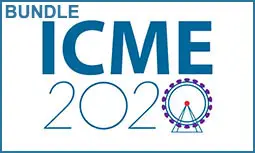Time varying quality estimation for HTTP based adaptive video streaming
Chaminda Hewage, Maria Martini
-
Members: FreeSPS
IEEE Members: $11.00
Non-members: $15.00Length: 14:09
10 Jul 2020
Rate adaptation of video can result in varying Quality of Experience (QoE) over time. For instance, the latest HTTP-based video streaming approaches rely on rate adaptation techniques to overcome the negative effects of time varying channel conditions. Therefore, in order to have a satisfactory user’s QoE in these situations, it is necessary to evaluate and predict subjective quality variations over time, termed here as Time Varying Subjective Quality (TVSQ). It is a challenge to model TVSQ due to hysteresis effects and non-linear responses of our Human Visual System (HVS). This study proposes a moving average filter based time varying quality metric, which accounts for the recency and primacy effects of our HVS. The performance of the proposed method is evaluated over a publicly available TVSQ database, which consists of 15 x 300-seconds videos evaluated by 25 subjects for time varying quality. The results show a good performance with respect to the state of the art. The simple calculations and the accuracy of the proposed method enable us to use this approach in real-time HTTP based streaming applications.



